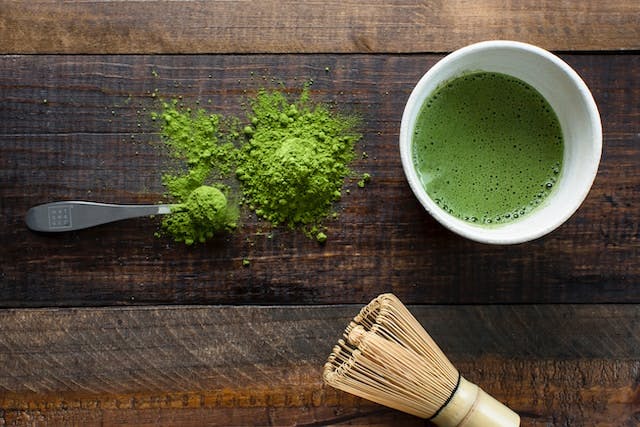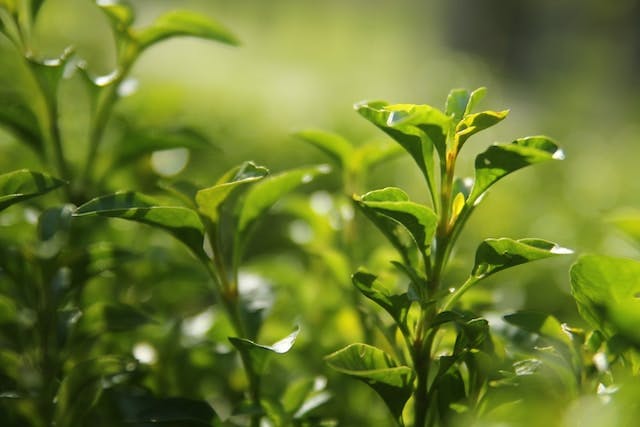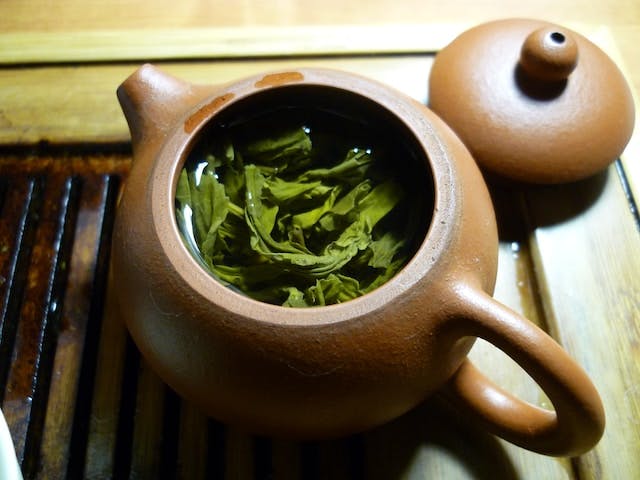Does Green Tea Have Caffeine?
Caffeine has become a common daily habit for many people in our fast-paced environment. It serves as a morning pick-me-up, an afternoon pick-me-up, and for some people, a soothing nightly routine. Green tea is one common source of this energizing chemical. This beverage has been enjoyed for millennia in many cultures due to its wealth of health advantages. However, a frequent query is whether green tea contains caffeine.
 Owner: Matcha & COGreen tea in white ceramic mug beside brown wooden brush
Owner: Matcha & COGreen tea in white ceramic mug beside brown wooden brushIt's important to know how much caffeine is in the drinks we consume every day. It assists us in controlling our intake and avoiding any negative repercussions that could result from overindulging. Those who are sensitive to caffeine, expectant mothers, and anyone with specific medical issues should be especially aware of this information. So let's examine the caffeine concentration of green tea to get to the bottom of the issue.
How Much Caffeine Is in Green Tea?
Yes, green tea does contain caffeine, which is the simple response to this query. However, compared to other common drinks like coffee and black tea, green tea often contains less caffeine.
A typical 8-ounce cup of green tea has about 28 mg of caffeine in it. Various elements, including the kind of green tea and brewing techniques, can affect this amount. Comparatively, an 8-ounce cup of coffee normally has 95 milligrams of caffeine and an equivalent amount of black tea typically has 47 milligrams.
So, while green tea does contain caffeine, it's a milder choice compared to coffee and black tea. This makes it a suitable option for those looking to reduce their caffeine intake without completely eliminating it from their diet.
Beverage | Serving Size | Average Caffeine Content |
|---|---|---|
Green Tea | 8 oz (237 ml) | 28 mg |
Black Tea | 8 oz (237 ml) | 47 mg |
Coffee | 8 oz (237 ml) | 95 mg |
Decaf Green Tea | 8 oz (237 ml) | < 5 mg |
Decaf Coffee | 8 oz (237 ml) | 2-5 mg |
Factors Influencing Caffeine Content in Green Tea
When it comes to the caffeine level in green tea, there is no one-size-fits-all solution. Several factors can alter the amount of caffeine in your cup of green tea.
Firstly, the type of green tea is important. Green tea comes in a variety of caffeine levels, including Sencha, Matcha, and Bancha. Matcha, a powdered type of green tea, has a higher level of caffeine because you're drinking the full tea leaf.
Secondly, the brewing time and temperature can both have an impact on the caffeine concentration. The more caffeine your tea will normally produce the longer and hotter you brew it. For instance, steeping green tea for 2-3 minutes yields less caffeine than brewing for 4-5 minutes.
Finally, the size of the tea leaves utilized can affect the caffeine content. When compared to whole-leaf tea, finely chopped tea leaves or tea dust found in tea bags frequently absorb faster and release more caffeine.
Understanding these elements can assist you in controlling the quantity of caffeine in your green tea, allowing you to tailor your tea-drinking experience to your specific needs and tastes.
Health Implications of Caffeine in Green Tea
Caffeine has a number of health benefits when consumed in moderation. However, it is equally critical to be aware of the potential hazards linked with its use.
Caffeine, on the other hand, can improve alertness, metabolism, and performance enhancement. It functions as a central nervous system stimulant, lowering weariness and boosting concentration and focus. Because of this, a cup of green tea can help you feel more awake and attentive.
Caffeine, like any stimulant, has potential adverse effects. Excessive consumption might cause sleep disruption, anxiety, and an elevated heart rate. It's also worth mentioning that caffeine sensitivity varies widely across persons. Some people may feel nervous after just one cup of green tea, but others can drink several cups without feeling jittery.
 Owner: Timothy NewmanGreen tea in close up photography
Owner: Timothy NewmanGreen tea in close up photographyCertain groups must be especially watchful of their caffeine consumption. Pregnant women, for example, are frequently recommended to reduce their caffeine consumption due to potential dangers related to pregnancy outcomes. Individuals with specific health concerns, such as heart disease or anxiety disorders, may also need to monitor or restrict their caffeine intake.
To summarize, while caffeine in green tea has some benefits, it is vital to eat it in moderation and be mindful of your personal tolerance levels. When in doubt, always seek the advice of a healthcare professional.
Frequently Asked Questions
As we delve deeper into the topic of caffeine in green tea, several questions often arise. Here, we address some of the most frequently asked questions.
Does decaffeinated green tea exist?
Yes, decaffeinated green tea does exist. This type of green tea undergoes a process to remove most of the caffeine content. However, it's important to note that decaffeinated does not mean 100% caffeine-free. A small amount of caffeine may still remain.
How does green tea compare to coffee in terms of caffeine content?
When it comes to caffeine content, green tea generally contains less caffeine than coffee. An 8-ounce cup of green tea contains around 28 milligrams of caffeine, while the same serving size of coffee has approximately 95 milligrams.
Can green tea cause caffeine addiction?
While green tea does contain caffeine, it's unlikely to cause caffeine addiction due to its lower caffeine content compared to other beverages like coffee. However, everyone's sensitivity to caffeine is different, and excessive consumption can lead to caffeine dependency.
How much green tea is safe to drink daily?
The amount of green tea that's safe to drink can vary depending on individual tolerance to caffeine. However, a common recommendation is 3 to 5 cups of green tea per day. This amount provides a beneficial level of antioxidants without contributing to excessive caffeine intake.
 Owner: Arseniy KapranGreen tea and clear liquid inside teapot
Owner: Arseniy KapranGreen tea and clear liquid inside teapotConclusion
This article has looked into the exciting topic of caffeine in green tea. Green tea does contain caffeine, albeit in smaller amounts than other popular beverages such as coffee and black tea. The caffeine concentration of green tea can be modified by factors such as green tea type, brewing time and temperature, and tea leaf size.
We've also talked about the health implications of caffeine in green tea, stressing both the advantages and disadvantages. While coffee can increase alertness and metabolism, too much of it can cause sleep disruption and anxiety. Caffeine consumption should be restricted to specific groups, such as pregnant women and those with certain health issues.
To summarize, green tea is a beautiful beverage that may be appreciated for its taste as well as its health advantages. However, as with other caffeinated beverages, it should be used in moderation. If you have any concerns about your caffeine consumption, you should always check with a healthcare practitioner. Enjoy your green tea responsibly and reap all of its advantages!
Editor & Tea Lover